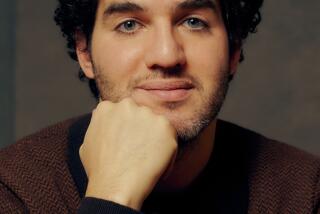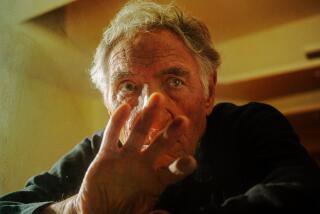Kim Fowley: impresario, Svengali, saint, devil
- Share via
Kim Fowley pulls DVDs, fliers, CDs, a hospital admission slip and more DVDs out of a jumble of media on the mixing board of a drab Hollywood strip-mall studio. Per usual, the infamous pop schlockmeister has a beautiful young woman by his side. Fowley wants to transform Snow Mercy, a scientist-turned-dominatrix/performance artist, into his latest star. But he’s got a dozen other hustles going on too, and he hands a reporter one copy after another of B-minus movies. They all feature Kim Fowley.
“I’m the king of bad taste,” says the man who started his songwriting, production and performance career with the 1960 novelty hit “Alley Oop.” Fowley went on to work with artists including KISS, the Byrds, Helen Reddy and Frank Zappa and is perhaps most famous for helping form the 1970s band the Runaways.
Somewhere along the way the bad man of rock ‘n’ rollbecame the John Waters-Roger Corman of the Sunset Strip. At 72, Fowley walks with a cane that he occasionally brandishes as a sword, adding alarming reach to his 6-foot-4 frame. He’s an eccentric, decadent statesman overseeing a cottage industry of videos, albums, a satellite radio show and a book. The DIY possibilities of the digital age suit his prolific/ADD productive style, for which quantity trumps quality.
Fowley has even taken to social media, posting videos of himself in a St. Vincent hospital gown on his Facebook page. He has to have an assistant — and there’s usually a bevy of attractive young women willing to offer their secretarial services — type his posts for him, because two bouts of childhood polio left his outer limbs beyond his complete control.
“I can do what no one can do, but I can’t do what everyone can do,” Fowley says. “I’m diligent and focused about survival. So that’s one of my secrets, throughout this career that I’ve had, is the word ‘no’ does not exist in my vocabulary.”
Kim Fowley is a survivor. The original self-proclaimed Mayor of the Sunset Strip (he passed the title to his pal Rodney Bingenheimer decades ago) has had prostrate cancer, melanoma and basal-cell carcinoma. Two years ago he was operated on for bladder cancer; he returns for surgical-recall treatments every six months. Fowley milks his condition for attention (“I merchandise my illness”), but he also has those moments that the awareness of mortality will bring — even to notorious showbiz jerks.
Fowley was born at the same hospital where he now receives bladder-cancer treatment, St. Vincent. His parents, Douglas Fowley and Shelby Payne, were minor actors. Their marriage did not survive Kim. By age 2, he was a foster child. He spent the rest of his childhood pingponging among foster homes, his parents and hospitals, a child of both Beverly Hills privilege and divorce neglect.
Fowley began his showbiz career on the day Buddy Holly,Ritchie Valens and the Big Bopper died in a plane crash. He claims to have had a song in the charts every year since 1960. He has written for Alice Cooper and performed spoken-word rants called “Animal Man,” recorded with Ben Vaughn and been covered by Sonic Youth. In March he and Mercy were featured artists at the Metro Times Blowout in Detroit. He’s a trash-pop legend who lives in dereliction in a squalid Hollywood apartment.
“I’m an anti-materialist,” Fowley says. “I live in an apartment where you would think I was an East German refugee. Because all my creature comforts go into my work and financing movies and music. And I pay everyone.”
Fowley’s sunset years find him reflecting on his Sunset years. His bons mots are featured in “The Sunset Strip,” the documentary by Hans Fjellestad that debuted at South by Southwest last month and includes Johnny Depp, Mickey Rourke, Runaways singer Cherie Currie and others. In the trailer, Fowley steals the show. Wearing streaks of green face paint, he unspools his spiel with poetic sagacity, like he’s the Homer of Hollywood: “The Sunset Strip is a civilization for the brokenhearted, the mistreated, the overlooked, the underloved and the doomed.”
Fowley left Hollywood for years, but the city drew him back. The Strip is no longer the central hangout it once was; instead the senior citizen has found his home in the city’s fetish clubs.
In Black Room Doom, the instant-cult film he shot last year, about an all-girl band named Black Room Doom, young women explore their sexual peccadilloes while director Fowley sports a dog collar. On April 3, Fowley, Mercy and members of BRD perform at a gothic cabaret show at Skinny’s Lounge in North Hollywood.
“The Runaways were flaming schoolgirls. Black Room Doom are leather ladies, latex, lust and love,” the Peter Pan barometer of youthful subcultures states. “Remember now where we are in the 21st century. Black is the new mainstream, gay is the new black, fetish is the new gay and normal is the new fetish.”
BRD is Fowley’s answer to “The Runaways,”Floria Sigismondi’s 2010 feature film. He appreciated actor Michael Shannon’s rendition of his character but did not like the way the movie, based on Currie’s book “Neon Angel,” cast him as the villain.
“It was a nighttime soap opera, with some rock music in it,” he says. “It was not, not, NOT, in bold letters, it was not the Runaways’ story.”
Iggy Pop knew Fowley in the Runaways days and thinks the movie didn’t do him justice. “Kim’s more vulnerable than that person,” Pop says. “He just looked like you could dis him and he’d die. He looked physically frail, a lot like Boris Karloff’s Frankenstein. He was the kind of guy if you were into something like comics and he was too, he’d be your friend over that for 47 years. He was not a human-being-oriented person. When he talks to you he stays on point. He’s always trying to think of some project.”
People love Kim Fowley or they hate him. And sometimes, even those who seem to hate him love him. In her Runaways documentary “Edgeplay,” filmmaker Victory Tischler-Blue, who, as Vicki Blue, was one of the band’s several bassists, depicts the prototypical Svengali whose dastardly acts drove Currie and drummer Sandy West into depression and addiction. Yet in an interview, Blue thanks Fowley for changing her life.
“Kim gave us such an incredible opportunity and tools, and they were totally unorthodox,” she says. “He does stuff; he moves forward every day. I learned how to make something out of nothing with Kim. It was the most valuable gift anyone could give me.”
But Blue also says “Edgeplay” is a movie about child abuse. In “Neon Angel,” Currie says Fowley performed sexual acts with an out-of-it woman in front of the teenage band members. Fowley denies the incident. Nowadays, he makes sure to surround himself with women who are over the age of consent. Mercy and the BRD players are poised, intelligent beings who do not come across as victims.
Then again, the master of manipulation knows that a consummate villain can be far more entertaining than an earnest hero. Fowley doesn’t particularly want people to like him. He’d rather they fear him.
“I’m a horrible human being with a heart of gold, or a piece of ... in a bag of diamonds. I’m the worst, horrifying but lovely. I’m a bad guy who does nice things.”
More to Read
The biggest entertainment stories
Get our big stories about Hollywood, film, television, music, arts, culture and more right in your inbox as soon as they publish.
You may occasionally receive promotional content from the Los Angeles Times.










